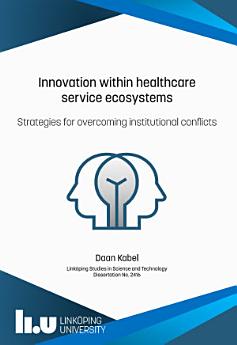Innovation within healthcare service ecosystems: Strategies for overcoming institutional conflicts
About this ebook
According to Service-Dominant (S-D) logic, innovation typically begins with the collection and refinement of ideas from a diverse set of actors. While the inclusion of this broad set of actors is essential for innovation, it can also lead to institutional conflicts or frictions between actors. These conflicts arise from competing or sometimes opposing ideas, which can be traced to multiple institutional logics—deeply ingrained norms, beliefs, and assumptions—that shape how actors frame and adopt ideas. Institutional logics also guides actors in how technologies, as carriers of ideas, are adopted, implemented and used. Institutional conflicts are critical obstacles to overcome during the innovation process; however, they are often overlooked. Studying these conflicts is particularly important because, in the worst-case scenario, they can become so severe that they block innovation within service ecosystems. The purpose of this thesis is to contribute to the understanding of service innovation that accounts for the multiplicity of institutional logics within a healthcare service ecosystem. Specifically, this thesis discusses a set of institutional conflicts and investigates how actors resolve or mitigate them. In this thesis, the actors proposing ideas for technology, including its integration within a healthcare service ecosystem, are broadly categorized according to three institutional logics: medical professional, market, and public welfare.
The results of this thesis discuss five recurring conflicts: differing meanings of technology, conflicting assumptions about medical responsibility, tensions in decision-making procedures, legal challenges related to resource ownership, and different expectations for resource sharing. To mitigate or resolve these conflicts, four recurring reconciliation strategies are identified: compromise, confrontation, mobilization, and avoidance. This thesis provides actionable recommendations on how to effectively manage institutional conflicts within a healthcare service innovation context. It makes three key contributions to service innovation research within the conceptual framework of S-D logic. The first theoretical contribution is the development of a novel typology of institutional reconciliation strategies. The second explores the factors that influence the success or failure of innovation within service ecosystems. Lastly, the managerial contribution identifies contemporary enablers and constraints that drives service innovation in healthcare ecosystems.
Inom hälso- och sjukvård har medicinsk teknik en möjlighet att ge ny och användbar kunskap för både patienter och vårdpersonal. För att denna teknik ska kunna bli användbar måste den integreras i vårdens ekosystem, vilket påverkar ett stort antal aktörer. För att lyckas med integrationen av tekniken i vårdens ekosystem krävs koordinering och samarbete mellan vårdpersonal, politiska aktörer, beslutsfattare och privata marknadsaktörer. Att förstå de utmaningar som uppstår vid etableringen av teknik är avgörande för att aktörer ska kunna driva innovation inom vårdens ekosystem.
Inom tjänsteforskning börjar innovation ofta med att insamling och förfining av idéer från ett brett spektrum av aktörer. Även om inkluderingen av detta breda urval av aktörer är avgörande för innovation, kan det också leda till institutionella konflikter, det vill säga spänningar och friktioner mellan aktörer på grund av konkurrerande eller ibland motsatta idéer. Dessa konflikter uppstår från flera institutionella logiker—djupt rotade normer, värderingar och attityder—som formar hur aktörerna förstår och införlivar idéer. Institutionella konflikter utgör således hinder att övervinna under innovationsprocessen; men i forskningen brukar de ofta förbises. Att studera dessa konflikter är därför särskilt viktigt, eftersom de i värsta fall kan bli så allvarliga att de blockerar innovation – etablerandet av teknik i form av ny kunskap – inom vårdens ekosystem. Denna avhandling bidrar till förståelsen av innovation som beaktar mångfalden av institutionella logiker inom vårdens ekosystem. Mer specifikt diskuterar denna avhandling institutionella konflikter och undersöker hur aktörer löser eller mildrar dessa. Aktörer som föreslår idéer för teknik, inklusive dess integration inom vårdens ekosystem, kan kategoriseras utifrån tre institutionella logiker: medicinsk, marknad och offentlig välfärd.
Avhandlingens resultat diskuterar fem återkommande konflikter: olika tolkningar av teknik, motstridiga antaganden om medicinskt ansvar, spänningar i beslutsprocesser, juridiska utmaningar relaterade till resursägande och olika förväntningar på resursdelning. För att mildra eller lösa dessa konflikter identifieras fyra återkommande strategier: kompromiss, konfrontation, mobilisering och undvikande. Denna avhandling ger konkreta rekommendationer om hur institutionella konflikter som påverkar tjänsteinnovation i en hälso- och sjukvårdskontext kan hanteras effektivt. Avhandlingen presenterar viktiga bidrag till forskningen om tjänsteinnovation. Det första teoretiska bidraget är utvecklingen av en ny typologi av strategier för hur aktörer kan hantera konflikter. Det andra bidraget undersöker de faktorer som påverkar framgång eller misslyckande i konflikthantering och innovation inom vårdens ekosystem. Det praktiska bidraget riktar sig till beslutsfattare och politiska aktörer i vårdens ekosystem och hur de kan främja innovation.







